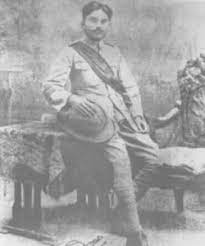Kazi Nazrul Islam P3

Equality
I sing the song of equality—
Here, fresh happiness blossoms
Into the hearts of all men
And fresh life on all faces.
Comrade, nobody is a king here, nobody a subject,
Nobody poor, nobody wealthy;
Nobody eats broken bits of rice here,
Nobody milk-film-cream.
Here, nobody bows down head before those
Who ride horses or get on motor-cars;
Seeing here the black men,
Hatred does not spring up
Into the white men’s breasts.
It is the place of equality—
Here, the black and the white
Have no separate graveyards
Nor any sperate churches.
Here is no fear from sentries or police-men.
It is the heaven where there is no division;
Here leaving all quarrels aside,
Men have clasped their hands as brothers.
Here is no division between religions,
No noise for scriptures;
Christian clergyman,
Hindu priest,
Muslim jurist
And Buddhist monk drink water here
From the same container.
This body, this mind is God’s prayer-house here;
Here His throne of sorrow is amidst the miseries
of men.
He responds to each call, by whatever name
Whoever appeals to Him, which way a child
Gets response from its mother.
Here, nobody quarrels on trouser, pants or dhuti;
Here clothed in dusty costumes
Everyone is happy.
Written by Kazi Nazrul Islam aged 25
Translation: 23.6.2017 Sirajganj
Kazi Nazrul Islam
The Rebel Poet of Bengal
The National Poet of Bangladesh and more truly a World Poet.
“I am not afraid of death; I am afraid of the death of the soul.”
“In the darkness of despair, I found the light of hope.”
“Let my words be a sword that cuts through ignorance and injustice.”

After the First World War
in 1920, when the 49th Bengal Regiment was disbanded, Nazrul returned to Calcutta to embark on his journey in journalism and literature. His poems, essays, and novels began to be published regularly in various periodicals, and within a year, he gained recognition not only among prominent Muslim intellectuals of the time but was also embraced by the Hindu literary community in Calcutta. In 1921, Nazrul traveled to Santiniketan to meet his master-poet and source of inspiration, Rabindranath Tagore.
That same year, Nazrul became engaged to Nargis, the niece of a well-known Muslim publisher, Ali Akbar Khan, in Daulatpur, Comilla. However, on the wedding day, June 18, 1921, he abruptly called off the marriage due to serious misunderstandings and disagreements. This experience left a profound mark on the young Nazrul, as many of his songs and poems reflect the deep emotional scars and his enduring affection for Nargis.



